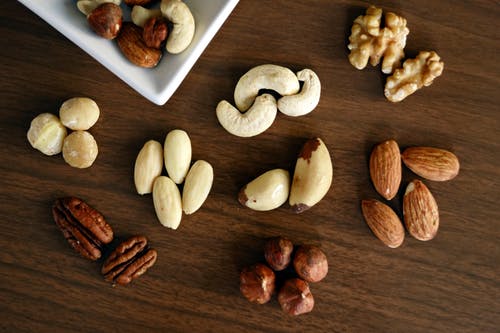The Anti-Alzheimer's Diet, Part 2

While there is no one fool-proof diet guaranteed to guard
against age-related cognitive decline, a series of recent studies have found a
possible link between consuming certain foods and remaining sharper for longer.
Nuts
We’ve known for a while that nuts are beneficial for the
brain. Yes, they’re high in fat, but the brain actually needs some fat to run
properly—as long as it’s the right kind. Walnuts, for instance, are a good source
of those all-important omega-3 fatty acids you’ve heard so much about, the ones
that help repair the cell membranes around neurons.
Even if walnuts are not your favorite, though, it’s still
worth grabbing a fistful of those crunchy legumes. Nuts also provide Vitamin E,
which protects cells—including neurons—from free radical damage.
They’re also linked with heart health, and better circulation means a better
supply of blood for the brain.
What’s the result of these benefits? In a 2014 study of 16,010
women over the age of 70, those who averaged five servings of nuts a week
performed noticeably better on the Telephone Interview for Cognitive Status
(TICS). Essentially, it was the equivalent of being two years younger.
And more recently, a 2019 study surveying 4822 Chinese
adults age 55 and older found that eating more than 10 grams of nuts a day—about
2 teaspoons—had a positive association with improved mental function. This
included not just memory but reasoning and thinking.
Perhaps not surprisingly, the most common nut consumed was the humble peanut.
Mushrooms
Already a walnut fan, and wondering what else you can do for
your gray matter? Consider incorporating more mushrooms into your diet. A team from
the Yong Loo Ling School of Medicine at the National University of Singapore
has discovered a possible link between regular consumption of cooked mushrooms
and lower chances of developing mild cognitive impairment.
(“Mild cognitive impairment,” or MCI, is the term for the bridge between the
normal memory decline we experience as we age, and actual dementia.)
Looking at over 600 Singapore residents over the age of 60,
the scientists found that those who ate two portions of mushrooms a week had a
50% lower chance of developing MCI. Granted, the study defined a single portion
as 2/3 of a cup cooked mushrooms, which is an awful lot of fungi—just sprinkling
a few mushroom slices over a pizza won’t cut it. On the plus side, even incorporating
a small portion of cooked mushrooms just once a week showed results.
And luckily, the varieties referenced in the study included
types you can easily find at your local grocery store: oyster, shitake, and
white button mushrooms.
Check out Robb’s new book and more
content at www.bestmindframe.com.




Comments
Post a Comment